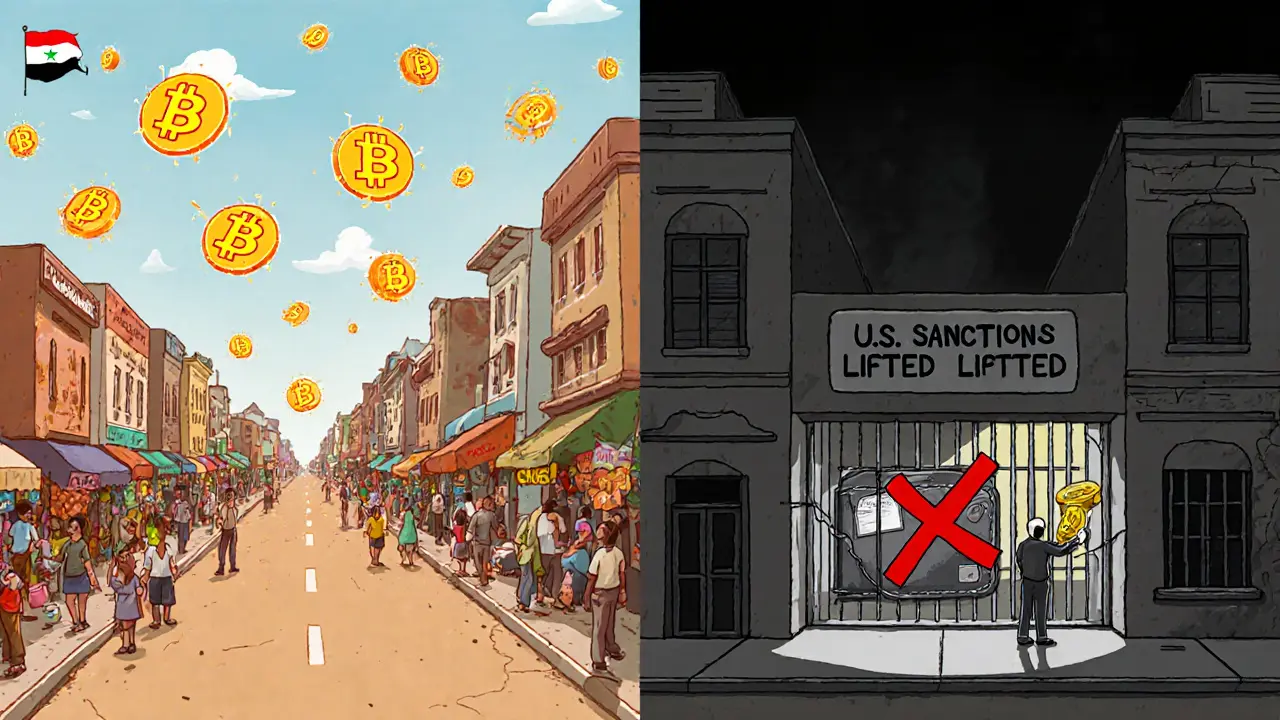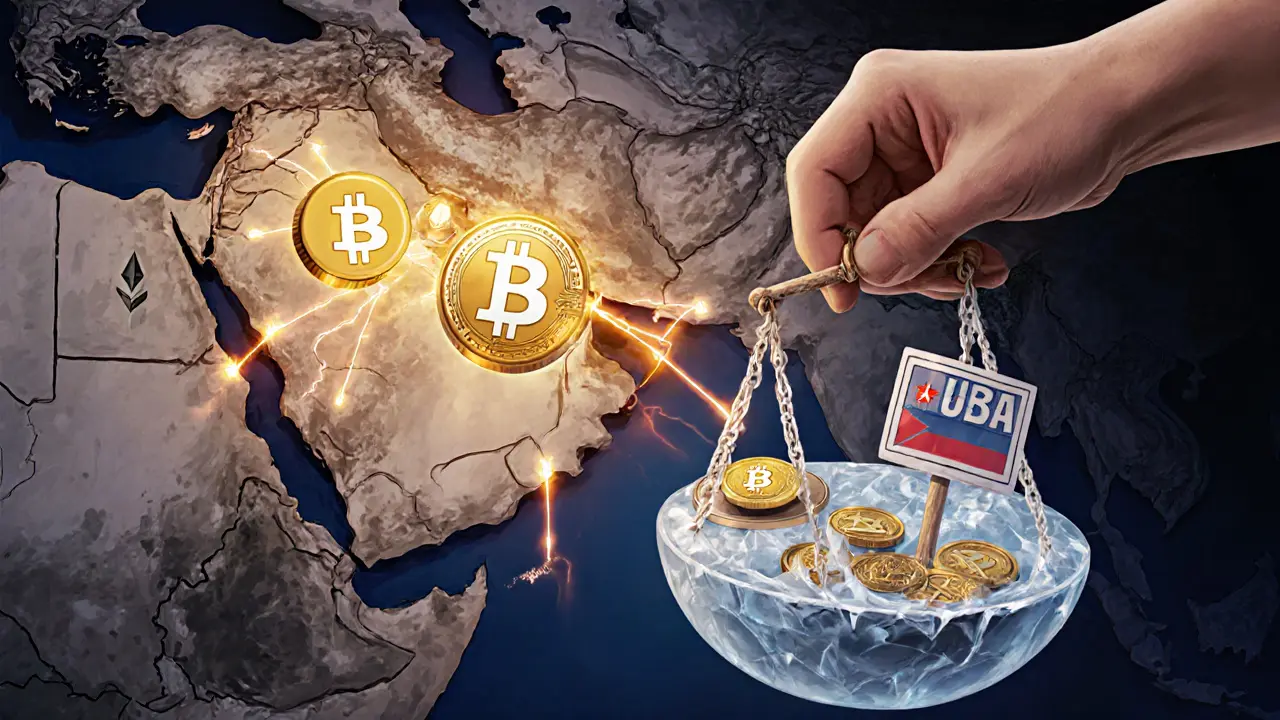International Sanctions and Crypto Restrictions in Syria and Cuba in 2025
 Jul, 24 2025
Jul, 24 2025
Sanctions Compliance Checker for Crypto Transactions
Check Compliance for Syria or Cuba Transactions
By July 2025, the U.S. government made two starkly different moves on international sanctions-one lifting decades of restrictions on Syria, the other tightening them on Cuba. These shifts didn’t just change trade rules. They rewrote the rules for cryptocurrency use, cross-border payments, and financial compliance in both countries.
Sanctions on Syria: A Complete Reversal
On July 1, 2025, the U.S. lifted its comprehensive sanctions on Syria. Executive Order 14312 revoked all six previous orders that had blocked business with the Syrian government since 2004. That meant U.S. banks could finally open correspondent accounts with Syrian financial institutions. American companies could legally export financial services, software, and even cloud infrastructure to Syria without special licenses. The Office of Foreign Assets Control (OFAC) removed the Central Bank of Syria and dozens of other Syrian banks from the Specially Designated Nationals (SDN) List. For the first time in over 20 years, international payment processors could route transactions through Syrian banks without fear of U.S. penalties. But it wasn’t a full open door. Targeted sanctions stayed in place for key figures: President Ahmed al-Sharaa’s inner circle, members of the Assad family, individuals tied to the captagon drug trade, and those accused of human rights abuses. If you’re doing business in Syria, you still need to screen every counterparty against the remaining SDN list. One wrong match can trigger a $1 million fine-even if you didn’t know the person was still sanctioned.Crypto in Syria: Legal Gray Zone, Real Access
Syria has no law that says cryptocurrency is legal. It also has no law that says it’s illegal. That’s not a loophole-it’s a vacuum. Before July 2025, major exchanges like Binance and Kraken blocked Syrian users. Their compliance teams couldn’t risk serving a country under U.S. sanctions, even if the user wasn’t connected to the regime. After the sanctions lifted, those blocks vanished. Syrians could sign up, deposit fiat via local banks, and trade Bitcoin, Ethereum, and stablecoins without restrictions. But here’s the catch: Syrian banks still don’t offer crypto services. No licensed exchange operates inside Syria. All trading happens through foreign platforms. That means Syrians rely on peer-to-peer (P2P) networks, local payment agents, and third-party gateways to convert crypto to cash. A trader in Damascus might sell Bitcoin to a friend who pays in Syrian pounds via mobile wallet, then use that cash to buy groceries or pay rent. Financial tech companies like Lightspark have stepped in with solutions. Their Grid Switch system lets institutions send payments to Syria using local real-time payment rails, settling in Bitcoin via the Lightning Network behind the scenes. No crypto touches the end user’s phone-but the transaction still clears faster and cheaper than traditional SWIFT. The real risk? Banks outside Syria. Even with U.S. sanctions lifted, European and Asian banks still hesitate. They don’t trust Syria’s AML/CFT controls. A payment from Germany to a Syrian supplier might get stuck for weeks while the bank runs extra checks. Some just reject it outright.Cuba: Tighter Than Ever
While Syria opened up, Cuba shut down. In June 2025, President Trump signed National Security Presidential Memorandum 5 (NSPM-5), reversing Biden’s 2023 easing of Cuba sanctions. The Cuba Assets Control Regulations (CACR) were reactivated with full force. U.S. persons can no longer travel for tourism. No U.S. companies can invest in Cuban startups. No U.S. banks can process payments for Cuban goods-even if the goods are sold by a third-country company. The crackdown hit harder than before. In July 2025, Key Holding, LLC-a Delaware logistics firm-paid $608,825 to OFAC after its Colombian subsidiary shipped 36 freight containers to Cuba. The company claimed it didn’t know the final destination. OFAC didn’t care. The CACR applies to all U.S. persons, including foreign subsidiaries. Ignorance isn’t a defense. Crypto isn’t banned in Cuba-but it’s nearly impossible to use legally. Cuban citizens can hold crypto. But they can’t buy it with Cuban pesos through regulated channels. No Cuban bank offers crypto services. Foreign exchanges block Cuban IPs. The only way to get crypto is through P2P trades with strangers or via third-country intermediaries, often at steep premiums. The Cuban government has no official stance on crypto. But it doesn’t need one. The U.S. sanctions do the work for them. If you’re a Cuban entrepreneur trying to raise funds from a U.S. investor, you’re blocked. If you want to pay a developer in Ukraine with Bitcoin, your bank in Mexico might freeze your account.
Why the Difference?
The U.S. didn’t lift sanctions on Syria because it trusted the government. It did so because the Assad regime changed tactics. After years of civil war, the regime cracked down on the captagon trade, dissolved the al-Nusrah Front (HTS), and began cooperating with U.S. counterterrorism efforts. The Trump administration called it a “strategic realignment.” Cuba? Nothing changed. The government still suppresses dissent. It still sends troops to support Russia in Ukraine. It still blocks internet access during protests. The U.S. didn’t see any reason to ease pressure. It’s not about democracy. It’s about leverage. Syria offered something the U.S. wanted: a partner in counterterrorism. Cuba offered nothing but resistance.What This Means for Crypto Users
If you’re in Syria: You now have access to global crypto markets. But you’re still on your own. No regulation. No consumer protection. No insurance. If a P2P buyer vanishes with your Bitcoin, you have no recourse. If you’re in Cuba: Crypto is technically possible, but practically blocked. The only people using it are those with connections outside the country, often at great personal risk. A Cuban doctor trading Bitcoin to pay for medicine is not a crypto pioneer-she’s a survivor. For businesses: Syria is a high-risk, high-reward opportunity. The market is untapped. The infrastructure is weak. But the legal path is now open-if you do your due diligence. Cuba? Avoid it. The penalties aren’t worth the potential return.
Compliance Is Still King
Even with sanctions lifted, compliance isn’t optional. U.S. financial institutions must still screen all transactions against the remaining SDN list. They must report suspicious activity. They must keep records for five years. A single mistake can cost millions. In 2025, a New York-based fintech firm paid $2.3 million in fines after it processed a $12,000 crypto transfer to a Syrian business that turned out to be owned by a sanctioned individual. The company said it used an automated screening tool. OFAC said the tool was outdated. The tool hadn’t been updated since June 2024. The lesson? Don’t rely on software alone. Manual review matters. Sanctions lists change daily. If you’re working with Syria, you need real-time screening, not quarterly updates.What’s Next?
The U.S. is doubling down on crypto enforcement. In August 2025, OFAC announced a new Crypto Sanctions Compliance Framework. It requires all U.S.-based exchanges to implement geofencing, IP blocking, and wallet tagging for sanctioned jurisdictions-even if the country isn’t under full sanctions. Syria’s crypto scene will grow. But it won’t be smooth. It’ll be messy, informal, and risky. Cuba’s will stay frozen. The bigger picture? Sanctions aren’t just about punishment anymore. They’re tools of geopolitical strategy. And crypto? It’s becoming the new battlefield.Can I legally send Bitcoin to Syria now?
Yes, but only if the recipient isn’t on OFAC’s remaining SDN list. You must screen the wallet address against updated sanctions lists before sending. Most exchanges now allow transfers to Syria, but you’re responsible for compliance. If the recipient is linked to the Assad regime or captagon trade, you could face penalties.
Is crypto legal in Cuba?
Cuba has no law banning crypto, but U.S. sanctions make it nearly impossible to use legally. U.S. banks and exchanges block Cuban users. Cuban banks don’t offer crypto services. Any crypto transaction involving U.S. dollars, U.S. companies, or U.S. infrastructure violates the CACR. Most Cubans who use crypto do so through risky P2P networks outside official channels.
Why did the U.S. lift sanctions on Syria but not Cuba?
The U.S. lifted sanctions on Syria because the regime took concrete steps to end the captagon drug trade, dissolve the al-Nusrah Front, and cooperate on counterterrorism. Cuba made no such changes. The Cuban government continues to support Russia, suppress dissent, and block internet access. The U.S. sees no strategic benefit in easing pressure on Cuba.
Can U.S. companies do business with Syria now?
Yes, but only with non-sanctioned entities. You can export software, financial services, and cloud infrastructure. You cannot trade with individuals or companies still on OFAC’s SDN list. You must conduct enhanced due diligence. Many U.S. firms still avoid Syria due to lingering banking risks and weak rule of law.
What happens if I accidentally send crypto to a sanctioned person in Syria?
You could face civil penalties up to $1 million or more, depending on the transaction value and whether you had a compliance program. OFAC considers intent, but even unintentional violations can result in fines. Always screen wallets before sending. Use tools that update in real time. Never assume a wallet is safe just because the country is no longer under sanctions.
Are there any crypto exchanges that work in Syria?
Major global exchanges like Binance, Kraken, and Coinbase now allow Syrian users to register and trade. However, no licensed exchange operates inside Syria. All trading happens through foreign platforms. Users rely on P2P networks to convert crypto to local currency. Withdrawals to Syrian bank accounts are still limited due to international banking hesitancy.
How do sanctions affect crypto mining in Syria and Cuba?
In Syria, crypto mining is unregulated but technically possible. Power shortages and internet instability make large-scale mining impractical. In Cuba, mining is rare due to power rationing and U.S. sanctions blocking access to foreign mining hardware and software. Even if someone mines Bitcoin in Cuba, they can’t legally cash out through official channels.
Will the U.S. reinstate sanctions on Syria in the future?
Possibly. The current relief is conditional. If the Syrian government resumes support for terrorism, reactivates the captagon trade, or commits new human rights abuses, the U.S. can quickly reimpose sanctions. OFAC has kept the legal framework intact. Reversing the policy would take only a new executive order.
Vaibhav Jaiswal
November 28, 2025 AT 00:42So Syria’s crypto scene is basically a wild west now - no rules, no safety nets, just people trading Bitcoin for bread via mobile wallets. I’ve seen this in other conflict zones before. The tech works, but the human cost? Heavy. People aren’t ‘adopting crypto’ - they’re surviving it.
Savan Prajapati
November 29, 2025 AT 00:58Cuba’s still screwed. No way out. U.S. sanctions are just a chokehold with extra steps.
stephen bullard
November 30, 2025 AT 18:49It’s wild how crypto became the silent battleground here. Not about freedom or tech - it’s about leverage. Syria gave up drugs and terrorists, so the U.S. gave them access. Cuba didn’t budge, so they stay locked out. Crypto didn’t change the game - it just became the scoreboard.
And honestly? This isn’t about democracy. It’s about who’s useful. Syria’s regime is still brutal, but now they’re a useful brutal. Cuba’s just stubborn. The U.S. doesn’t care about ideals - it cares about outcomes. That’s the uncomfortable truth.
Abby cant tell ya
November 30, 2025 AT 23:03Of course the U.S. lifted sanctions on Syria. Assad’s still a monster, but now he’s a *useful* monster. Meanwhile, Cuba’s just poor and proud - and the U.S. hates that. This isn’t policy, it’s petty. And now poor Syrians are stuck gambling with Bitcoin because their banks still won’t touch them. Pathetic.
Michael Labelle
December 2, 2025 AT 14:43Real talk: even if you’re not on the SDN list, the banking system still treats Syria like a virus. I work in fintech. We had a client in Damascus last month. Our compliance team spent 11 days just verifying one vendor. The bank in Germany froze the transfer twice. The tech works - but the human fear? That’s the real barrier.
SHASHI SHEKHAR
December 4, 2025 AT 00:40Broooooo 🤯 Syria’s crypto scene is now the most chaotic, beautiful mess on Earth. No laws? Perfect. People are building their own financial system from scratch - P2P agents, mobile wallets, Lightning Network gateways like Lightspark. No banks? No problem. They’re using WhatsApp groups to match buyers and sellers. One guy in Aleppo told me he paid his kid’s school fees in BTC via a friend who cashed out in Homs. No paperwork. No KYC. Just trust and a phone.
And yeah, the risk is insane - if someone ghosts you after you send 0.5 BTC, you’re screwed. But what else can you do? The Syrian pound is worth less than toilet paper. Crypto isn’t a luxury here - it’s oxygen.
Meanwhile, Cuba? Still stuck in 2009. The government doesn’t even need to ban crypto. The U.S. does it for them. A Cuban doctor trading Bitcoin to buy insulin? That’s not innovation - that’s rebellion with a QR code. And the fact that the world watches and does nothing? That’s the real crime.
Also, OFAC’s new Crypto Sanctions Framework? LOL. They’re trying to geofence Bitcoin like it’s a TikTok trend. You can’t geofence decentralization. The moment they block a wallet, someone in Turkey or Nigeria routes it through a proxy. It’s like trying to ban water because it’s wet.
And don’t even get me started on mining. Syria’s got power cuts 18 hours a day - but people still mine with car batteries and solar panels. Cuba? No hardware, no power, no hope. The real crypto revolution isn’t in Silicon Valley - it’s in Damascus kitchens and Havana rooftops.
Also, if you think this is over? Wait till Iran or Venezuela sees this. The U.S. just handed a blueprint to every sanctioned nation: ‘If you play nice, we’ll let you use the internet’s money.’ That’s not policy. That’s geopolitics with a crypto twist. 🚀💸
Vance Ashby
December 5, 2025 AT 17:17Wait so you’re telling me I can send BTC to Syria now? 😳 But only if they’re not on the SDN list? How do I even check that? The wallet address doesn’t show if someone’s linked to the captagon trade. I’m supposed to run manual checks on every transaction? That’s not compliance - that’s a full-time job. And OFAC says ‘use real-time tools’ but the only ones that work cost $50k/month. So now small businesses are just gonna avoid Syria entirely. Great. Real progressive.
Angel RYAN
December 7, 2025 AT 00:38Thanks for laying this out so clearly. I’ve been watching Syria’s crypto shift and honestly, it’s the most honest thing the U.S. has done in years. Not because it’s moral - but because it’s real. People in Damascus aren’t waiting for permission to survive. They’re building. And if we’re smart, we’ll help them build better - not just monitor them for mistakes.